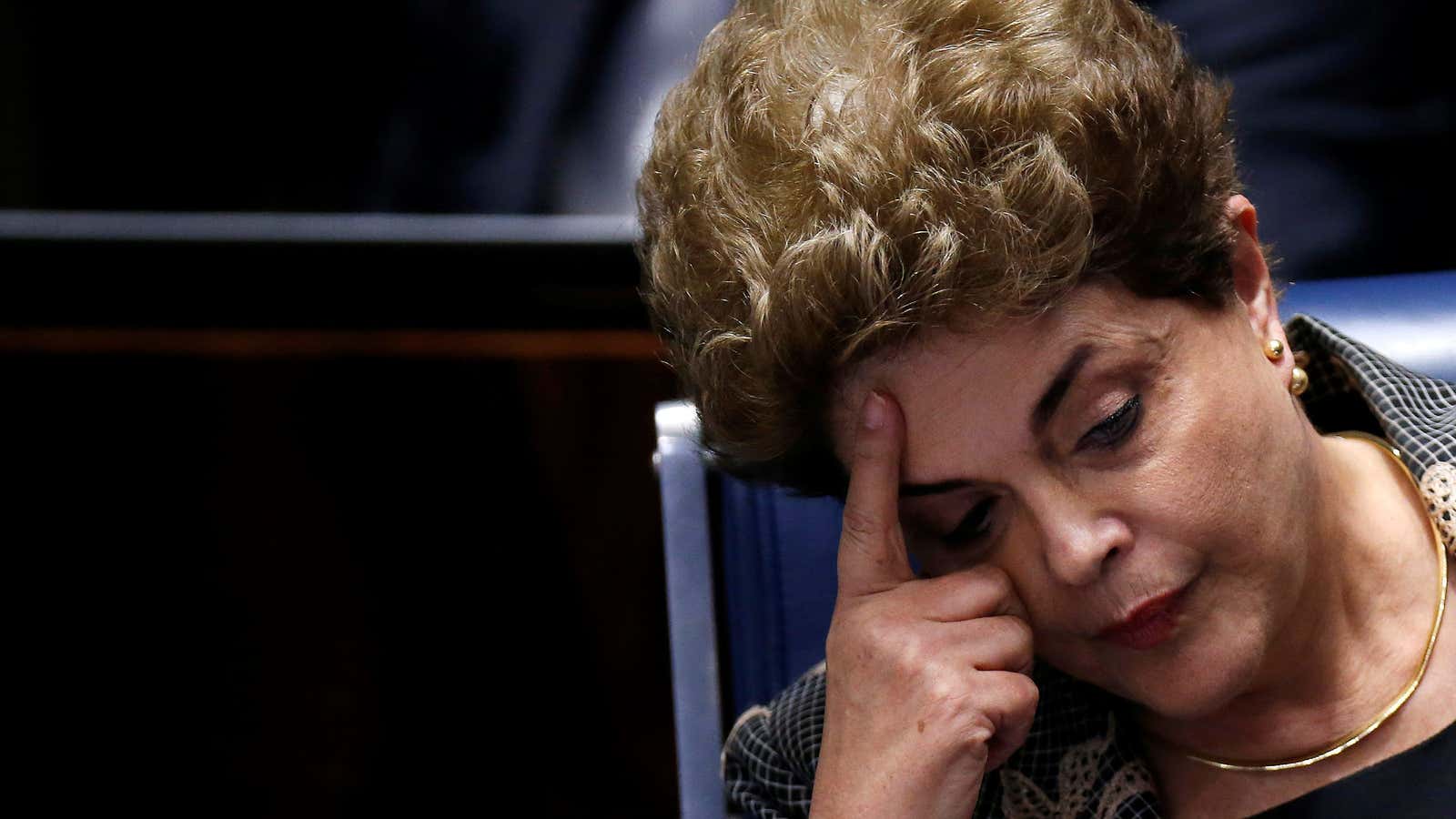Dilma Rousseff is officially out. Brazil’s troubled president had been fending off attacks for months, and since the middle of May, she has been suspended from her post. Today (Aug. 31), the Brazilian senate voted to impeach her by a vote of 61 to 20.
After a heated trial that started last week, the senators found her guilty of violating budget rules to hide the size of the national deficit. Acting president Michel Temer, from a center-right opposing party, will finish the rest of her term, which will last until the end of 2018.
Rousseff’s impeachment is the final stroke in the disastrous fall from grace of the Worker’s Party of Brazil, whose time in power started out with an era by unprecedented prosperity for many Brazilians and the country’s growing swagger in global politics.
Dilma, as she is known to Brazilians, isn’t fully to blame for the various factors that led to her impeachment, which was more of a political affair than a judicial process. But she has been seen as an inept leader, and she held high-ranking posts at times when government was mired in corruption.
Here’s a chronicle of Dilma’s demise, in five charts.
1. Commodity boom busted
Rousseff didn’t cause the collapse in the prices of commodities, including oil, that had powered the Brazilian economy in previous years. But when Brazil’s economic outlook was still sunny, she and her predecessor (and mentor), Luiz Inácio Lula da Silva, did little to prepare for a rainy day.
2. Economic nosedive
During their tenure, the Brazilian economy had grown dependent on the commodity boom windfall, so it was hit hard (pdf, pg. 3) when that expansion ceased.
3. Fiscal troubles
It didn’t help that the Brazilian government—particularly during Rousseff’s administration—developed a bad spending habit. That left Rousseff with the difficult task of taming a huge budget deficit while Brazil underwent its worst economic crisis in decades. She wasn’t very effective, struggling at every turn to get a divided congress to back her austerity measures.
4. Lost swagger
The bad economy plus the political infighting put a dent in business confidence in Brazil. Foreign investment shrank, and Brazil’s credit ratings began their steady decline to junk status. One hopeful sign is the country’s rising industrial output and a recent rebound in business confidence, which could signal the beginning of a recovery.
5. Flagging support
Brazilians are feeling less and less optimistic about their president. Her approval ratings have gone from stellar to dismal. Massive protests against her government filled the main avenues of Brazil’s largest cities.
6. Political decay
A mammoth investigation led by federal prosecutors (Portuguese) into Brazil’s semi-public oil giant Petrobras revealed widespread corruption among Brazil’s political elites, further eroding confidence in government. Dozens of high-ranking politicians have been implicated during the Petrobras anti-corruption operation. To Rousseff’s credit, the probe unfolded largely unimpeded under her watch. But the alleged improprieties also happened under her watch, when she was the company’s chairwoman.
More than the fallout from any alleged personal wrongdoing, which she denies, Rousseff was hurt by the free-for-all attitude in Brazilian politics that seemed to breed both corruption and fierce power struggles that undermined government effectiveness. Her impeachment proceedings, which were carried out by congress, reflect both.
Many of the politicians who make up Brazil’s congress have been embroiled with the law themselves. In the senate, 60.5% of members face or have faced judicial proceedings for criminal offenses or administrative irregularities, such as faulty accounting, according to Brazilian non-profit Transparência. In the chamber of deputies, the percentage is 59.3%.
Rousseff’s peers in Brazilian politics do not make up the kind of upstanding, impartial jury she might have hoped for.
